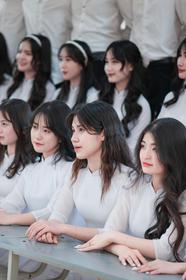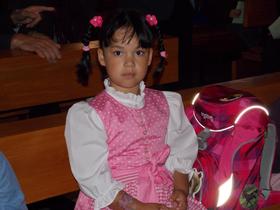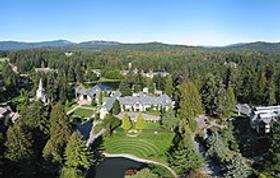Read more details about Phillips Exeter Academy on their 2025-26 profile page.
Reflections and Advice:
1.) What do you think makes your school unique relative to other boarding schools?
The Harkness method of education was founded at Phillips Exeter, so I think this makes Exeter special. Harkness a learning method based on discussion and exchange of ideas among students, with the instructor as a facilitator rather than a lecturer. Heavy investment in special oval tables for classrooms facilitates this style of learning at Exeter. This style of learning promotes voices at the table and confidence when speaking in public, both of which are skills that can be applied to the professional landscape. I found it particularly effective for humanities and social science classes, and appreciated the voice and confidence it helped me develop. However, Harkness was not so effective for math and sciences. I felt like I needed to be directly taught what I needed to know, not discuss it.
2.) What was the best thing that happened to you in boarding school?
My advisor was one of the best things I gained from boarding school. I wouldn’t have survived the pressure or the social complications without her, and in general the faculty were wonderful and contributed to the positive aspects of my experience at Exeter. I have definitely grown as a person through Exeter, especially in terms of my confidence at a discussion or conference table. My ability to express my opinions and critically analyze others’ has drastically improved.
3.) What might you have done differently during your boarding school experience?
I might have left after my junior year there. I would say, boarding school isn’t for everyone. If you go through two years there and you decide it’s not a good fit, don’t shy away from transferring or moving back to your home school just because it’s a change. I wish I had been bold enough to recognize that boarding school wasn’t healthy for me.
4.) What did you like most about your school?
Harkness in humanities and social sciences.
5.) Do you have any final words of wisdom for visiting or incoming students to your school?
Grill is a great place to hang out late at night before check-in! EP is also great.
Academics:
1.) Describe the academics at your school - what did you like most about it?
Critical thinking and discussion were at the core of my education at Exeter. From English classes to topic courses on the history of China, students were always encouraged to use the classroom as a resource for developing thoughts. Bouncing ideas and connecting themes in class were some of the most valuable parts of my education there. I also entered Exeter as a pretty shy student, unwilling to speak out in class. Because so much of classes was based in discussion, however, I quickly learned how to reflect on and respond to classmates' thoughts, and started to understand the flow of discussion and how to read a room. This has proven to be an invaluable skill in my college career and in exploring future job opportunities. However, I think the heavy workload affected my ability to truly appreciate the interesting content of my classes. The workload was often so heavy that it encouraged skimming and cutting corners, and sometimes even academic dishonesty for some of my friends. Learning to skim and prioritize my time was definitely a skill I appreciated gaining at Exeter, but I wish it had been more balanced so I didn’t always have to be thinking of ways to skimp on my work. Some students decided to do all of their work and never sleep, resulting in really poor mental health. I personally chose sleep over academics, but it meant I didn’t do as well as other students.
Athletics:
1.) Describe the athletics at your school - what did you like most about it?
The athletic facilities were phenomenal, and I appreciated the opportunity to try a sport I’d never played by joining the JV hockey team! I still play in college, and really enjoy it. The physical education requirement also promoted healthy exercise habits, even if it was as simple as Yoga as Meditation.
Art, Music, and Theatre:
1.) Describe the arts program at your school - what did you like most about it?
I didn’t participate in visual arts or theater at Exeter, but I was involved in music. I think the music department is definitely supportive of classical music more than other genres, but the facilities are impressive and in my last year, they installed an electronic music production lab in the building. This helped me pursue my interest in popular music. I wish it had been installed earlier in my time at Exeter, but I hope future students make good use of it!
Extracurricular Opportunities:
1.) Describe the extracurriculars offered at your school - what did you like most about it?
I wasn’t heavily involved in extracurriculars, and I think many of the clubs were poorly run because of how busy students at Exeter are. However, I enjoyed the social aspect of going to some club meetings.
Dorm Life:
1.) Describe the dorm life in your school - what did you like most about it?
Dorms are mixed-grade, so younger, incoming students get to have some guidance from older students. In my last year, Exeter was working on gender neutral housing, but during most of my time there it was only single gender dorms. I appreciated having the guidance of older girls in my dorm, which was about 50 girls total (one of the larger dorms). In my senior year, I moved into a house of 9 students, about half of which were new transfer students. I liked the social change and the quieter, smaller living environment. In this way, Exeter offers alternative housing options for upperclassmen, but in general, students stay in the same dorm all four years.
Dining:
1.) Describe the dining arrangements at your school.
There were two dining halls, Wetherall and Elm, Wetherall being open only on weekdays and Elm being open for more extended hours. The food at Wetherall was generally more vegetarian-friendly and healthier, while Elm offered classic cafeteria options like pizza, pasta, burgers and salad. I honestly don’t remember the specifics of the weekly menu, but I remember getting somewhat sick of the food over my four years. Despite this, the options were relatively balanced and not horrible. There are no meal swipes- the dining halls are just open, which was nice. It meant you could have 6 meals in a day if you wanted to, instead of 3 large meals. The dining halls were also pretty central to social life.
Social and Town Life:
1.) Describe the school's town and surrounding area.
Exeter is a really small town, and after four years it started to feel too small. However, the river is gorgeous and there are nice places to walk. Also, the town feels really New England and quaint, which I appreciated. The restaurant choices are limited but good, and the town often puts on community events that students can help staff.
2.) Describe the social life at your school - what did you like most about it?
Social life revolved around school events, classes, dorm life, and dining. It was fairly clique-y, and popularity was apparent, just like any other high school. I didn’t have a particularly healthy social life at Exeter, but I can’t speak to other experiences. I think the pressure there and class divide (between wealthy students and those on financial aid) was often a barrier to friendships.
Daily Schedule:
Weekday
7:00 AM
Wake up
Weekend
12:00 AM
Wake up
Read more details about Phillips Exeter Academy on their 2025-26 profile page.
Alumni Reviews Review School
Review
Description
Phillips Exeter is distinct for its use of the Harkness Method and its unique athletic opportunities afforded by a robust alumni network and excellent teachers from various high-level academic positions within their fields. Harkness, a. . .
The use of the Harkness table. The discussion based, or flipped, classroom is what truly separates Exeter from all other private schools. . .
The Harkness table is used in all classrooms, facilitating discussion and exploration of subjects that allow students to take the reins on their own education. With classes averaging 12 students or fewer, every student is. . .
Show more reviews (27 reviews)
Recent Articles

Types of Boarding Schools (2025 Updated Guide)
Explore key types of boarding schools in 2025 with updated tuition, trends, and expert insights to guide families in choosing the right fit.

Career Pathways Through Boarding School Programs
Explore how Career Pathways Through Boarding School shape internships, mentorships, and long-term success for today’s students.

Boarding vs Day School: Which Is the Better Investment?
Boarding vs Day School costs, value, outcomes, and ROI explained for families weighing today’s educational investment.





